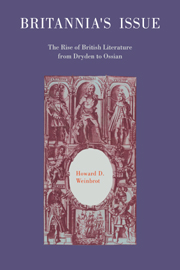Book contents
- Frontmatter
- Contents
- Acknowledgments and editorial notes
- INTRODUCTION: An overview of scope and method
- PART I CONTEXTS: INTELLECTUAL, PSYCHOLOGICAL, AND NATIONAL
- PART II TEXTS WITHIN CONTEXTS. ESSAYING ENGLAND: OUR GENIUS, OUR CLIME
- Prologue to Part II
- 5 DRYDEN'S “ESSAY OF DRAMATICK POESIE:” THE POETICS OF NATIONALISM
- 6 HOMERIC WARS
- 7 THE “PAX ROMANA” AND THE “PAX BRITANNICA”: THE ETHICS OF WAR AND THE ETHICS OF TRADE
- 8 “WINDSOR FOREST” AND “THE RAPE OF THE LOCK”
- PART III GROWING ONE'S OWN. THE BRITISH ODE FROM COWLEY TO GRAY
- PART IV EXPANDING THE BORDERS. JEWS AND JESUS: THIS ISRAEL, THIS ENGLAND
- PART V CELTS, GERMANS, AND SCOTS: TOWARDS A UNITED KINGDOM
- APPENDIX: The text of Handel's “Israel in Egypt”
- Index
5 - DRYDEN'S “ESSAY OF DRAMATICK POESIE:” THE POETICS OF NATIONALISM
Published online by Cambridge University Press: 15 December 2009
- Frontmatter
- Contents
- Acknowledgments and editorial notes
- INTRODUCTION: An overview of scope and method
- PART I CONTEXTS: INTELLECTUAL, PSYCHOLOGICAL, AND NATIONAL
- PART II TEXTS WITHIN CONTEXTS. ESSAYING ENGLAND: OUR GENIUS, OUR CLIME
- Prologue to Part II
- 5 DRYDEN'S “ESSAY OF DRAMATICK POESIE:” THE POETICS OF NATIONALISM
- 6 HOMERIC WARS
- 7 THE “PAX ROMANA” AND THE “PAX BRITANNICA”: THE ETHICS OF WAR AND THE ETHICS OF TRADE
- 8 “WINDSOR FOREST” AND “THE RAPE OF THE LOCK”
- PART III GROWING ONE'S OWN. THE BRITISH ODE FROM COWLEY TO GRAY
- PART IV EXPANDING THE BORDERS. JEWS AND JESUS: THIS ISRAEL, THIS ENGLAND
- PART V CELTS, GERMANS, AND SCOTS: TOWARDS A UNITED KINGDOM
- APPENDIX: The text of Handel's “Israel in Egypt”
- Index
Summary
DRYDEN AND READINGS OF THE “ESSAY”
Dryden himself encourages the traditional view of An Essay of Dramatick Poesie (1668). He tells Charles, Lord Buckhurst, that having changed his mind about some aspects of the essay scarcely matters, since “all I have said is problematical” and does not “reconcile but … relate” different opinions. Yet more, in the “Defence” of his Essay he brusquely tells Sir Robert Howard that he is neither dictatorial nor magisterial as charged. His entire discourse “was Sceptical” in the Socratic, Platonic, and Ciceronian mode of the Ancients and the Royal Society, as the title Essay implies. It also “is a Dialogue sustain'd by persons of several opinions, all of them left doubtful, to be determined by the Readers in general; and more particularly defer'd to the accurate Judgment of my Lord Buckhurst, to whom I made a Dedication of my Book.”
Later readers have been more pliable, or gullible, than Sir Robert, for one frequently reads about Dryden's detachment, skepticism, inclusiveness of mind or benevolent refusal to express a clear preference in the Essay. Phillip Harth, however, has demonstrated that for Dryden skepticism is a method not a conclusion; it enhances free ninquiry and challenges to authority while emerging with probability. Harth shows that in the Essay itself Dryden gives his own views on modern drama to Eugenius and Neander, each of whom speaks far longer than his opponents Crites and Lisideius, and is the final speaker who refutes without being refuted. Whatever Dryden's protective mask, “It would be a dull reader who could not decide which speaker had the advantage in such arguments.”
This inference seems too sensible to be persuasive.
- Type
- Chapter
- Information
- Britannia's IssueThe Rise of British Literature from Dryden to Ossian, pp. 150 - 192Publisher: Cambridge University PressPrint publication year: 1993



